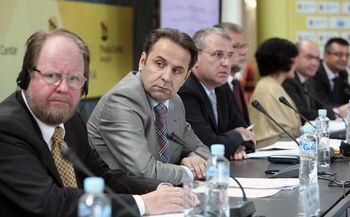- Serbia
Get to know Serbia
- Citizens
Culture and science
Health services
Pension and disability insurance
- Business
Employment
Economy
- Media
- Government
- Contact
Keep in touch
Contact form
Back
Keepin touch
Whether you have a question, comment, suggestion or any problem in the purview of the government, send us your message and we will try to respond as soon as possible. If your problem is not in our purview, we will forward your message to the relevant institution.
Q:
A:
All social structures to engage in solving issue of refugees
Belgrade,
20 June 2008
Serbian Minister of Labour and Social Policy Rasim Ljajic stated that regardless of the integration process of refugees and IDPs in Serbia, these people are still faced with poverty and unemployment.
At a press conference on the World Refugee Day themed "How to Do More: Refugees and IDPs in Poverty Reduction Processes", Ljajic specified that 60% of refugees and IDPs in Serbia are unemployed and 45% live in rented flats.
Though statistically there has been progress in solving this issue, the fact is that these people are still faced with enormous problems, said Ljajic.
According to him, in the early 1990s, there were around 750,000 registered refugees in Serbia, whereas today there are over 100,000 as well as additional 200,000 IDPs from Kosovo-Metohija.
He recalled that in 1996 there were over 700 collective refugee centres in Serbia, adding that today there are 77, 17 of which are in Kosovo-Metohija and 60 in central Serbia, which shows that the state has tried hard to solve this issue.
If the issue of refugees is not solved, the reconciliation process in the region will be difficult and much longer, warned Ljajic and pointed put the need to amend the 1992 Law on refugees.
He announced that once the new government is formed, an emergency session will be initiated between representatives of the international community and signatories of the Sarajevo Declaration with the aim of reaching agreement on emergency steps for its implementation.
Representatives of the international community, civil sector, refugee organisations and associations must be our partners in this work, because the problem of refugees cannot be resolved by only one ministry or state organ, but it requires the participation of all structures of society and the state, Ljajic underlined.
Serbian Commissioner for Refugees Dragisa Dabetic said that Serbia’s responsibility is to continue the process of refugee integration. That requires significant budgetary funds, as well as donations and support from the international community.
Member of the Serbian Deputy Prime Minister’s Team for implementation of the poverty reduction strategy Zarko Sunderic said that 15% of IDPs in Serbia currently live below the poverty line, while the refugee population lives above that level.
Head of the UNHCR office in Serbia Lennart Kotsalainen said that apart from poverty and unemployment, low level of education and inadequate medical care are other major problems for refugees and displaced persons.
He said that in the next two or three years, Serbia should use the support of the international community and close the chapter on refugees, and added that that will be one of the most important tasks of the new government.
Head of the OSCE mission to Serbia Hans Ola Urstad said that Serbia should solve the problems of refugees through cooperation of all ministries, the civil sector and the international institutions. That should be done in a quick and efficient way, since those people cannot wait anymore, Urstad underlined.
Though statistically there has been progress in solving this issue, the fact is that these people are still faced with enormous problems, said Ljajic.
According to him, in the early 1990s, there were around 750,000 registered refugees in Serbia, whereas today there are over 100,000 as well as additional 200,000 IDPs from Kosovo-Metohija.
He recalled that in 1996 there were over 700 collective refugee centres in Serbia, adding that today there are 77, 17 of which are in Kosovo-Metohija and 60 in central Serbia, which shows that the state has tried hard to solve this issue.
If the issue of refugees is not solved, the reconciliation process in the region will be difficult and much longer, warned Ljajic and pointed put the need to amend the 1992 Law on refugees.
He announced that once the new government is formed, an emergency session will be initiated between representatives of the international community and signatories of the Sarajevo Declaration with the aim of reaching agreement on emergency steps for its implementation.
Representatives of the international community, civil sector, refugee organisations and associations must be our partners in this work, because the problem of refugees cannot be resolved by only one ministry or state organ, but it requires the participation of all structures of society and the state, Ljajic underlined.
Serbian Commissioner for Refugees Dragisa Dabetic said that Serbia’s responsibility is to continue the process of refugee integration. That requires significant budgetary funds, as well as donations and support from the international community.
Member of the Serbian Deputy Prime Minister’s Team for implementation of the poverty reduction strategy Zarko Sunderic said that 15% of IDPs in Serbia currently live below the poverty line, while the refugee population lives above that level.
Head of the UNHCR office in Serbia Lennart Kotsalainen said that apart from poverty and unemployment, low level of education and inadequate medical care are other major problems for refugees and displaced persons.
He said that in the next two or three years, Serbia should use the support of the international community and close the chapter on refugees, and added that that will be one of the most important tasks of the new government.
Head of the OSCE mission to Serbia Hans Ola Urstad said that Serbia should solve the problems of refugees through cooperation of all ministries, the civil sector and the international institutions. That should be done in a quick and efficient way, since those people cannot wait anymore, Urstad underlined.
-
 Belgrade, 22 January 2025
Belgrade, 22 January 2025Egypt one of Serbia’s closest partners on international stage
-
 Belgrade, 9 July 2024
Belgrade, 9 July 2024Support for 104 associations in diaspora that preserve Serbian language, culture
-
 Belgrade, 15 April 2024
Belgrade, 15 April 2024Competition for StarTech grants open until 31 May
-
 Belgrade, 2 October 2023
Belgrade, 2 October 2023Serbia respects Resolution 1244 and will do everything to preserve peace
-
 Belgrade, 13 September 2023
Belgrade, 13 September 2023Day of Serbian Unity to be celebrated outside borders of Serbia, Republika Srpska for the first time
-
 Belgrade, 8 August 2023
Belgrade, 8 August 2023RSD 24.2m in state aid paid out to citizens affected by storm
-
 Belgrade, 17 June 2023
Belgrade, 17 June 2023Belgrade is doing everything to preserve peace in Kosovo and Metohija
-
 Belgrade, 15 June 2023
Belgrade, 15 June 2023Slovenia will continue to support Serbia on its way to EU
-
 Belgrade, 5 May 2023
Belgrade, 5 May 2023Emergency measures, tightening of conditions for possessing weapons
-
 Belgrade, 3 May 2023
Belgrade, 3 May 2023Three days of mourning in Serbia over tragedy at Vladislav Ribnikar primary school


